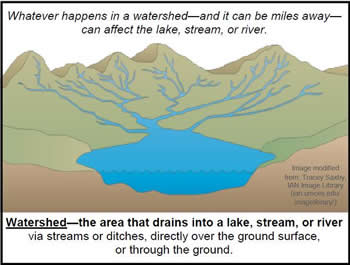Home → Land Resources → Programs → Watershed Management
Watershed Management

When rain water, also referred to as stormwater, hits the earth, it either soaks into the ground, or it runs over the surface until it reaches a surface water. If the stormwater stayed clean, there would be little concern for water quality. However, in many cases, where the water crosses developed and agricultural areas, it picks up pollutants, including soil particles, nutrients, bacteria and other toxic materials it comes in contact with. These pollutants are often carried all the way to a surface water such as a stream, river, lake, wetland or coastal water.
A watershed is all of the land area from which stormwater runoff drains to a given surface water. Watershed management focuses on land use activities throughout a watershed with the goal of preventing polluted runoff from those activities from reaching surface water. This can be accomplished in a variety of ways, such as providing areas of natural vegetation for runoff water to flow through, by directing it to areas where it can soak into the ground, or by taking steps to prevent the water from becoming polluted in the first place. Due to its diffuse nature, polluted runoff has not been effectively managed through regulatory programs alone. Watershed management also involves a number of other activities , such as identifying pollution problems in a watershed; educating landowners on practices they can adopt to keep water clean; and monitoring the condition of receiving waters to determine if the water is being adequately protected or restored.
The DEP is involved in watershed management in several ways. Education and training programs are designed to reach citizens living and working in the individual watersheds. Technical assistance is also offered by DEP staff to local groups, who are interested in surveying sources of pollution within their watersheds, and/or in developing watershed management plans for eliminating or reducing pollution sources. The DEP administers several grant programs designed to offer non-profit organizations assistance in carrying out these activities. The department organizes monitoring and assessment of water quality in lakes, rivers and streams. In addition, the DEP administers permit programs to manage potential new pollution sources throughout the organized municipalities in the state, including the Site Location Law, Natural Resources Protection Act and the Stormwater Management Law.
Contacts
Environmental Assessment:
Wendy Garland (207) 615-2451
Nonpoint Source Grants (319) Program:
Alex Wong (207) 694-9533
Nonpoint Source Training Center:
John Maclaine (207) 615-3279, fax (207) 287-2814
Stormwater Coordinator:
vacant
Technical Assistance:
David Waddell (207) 215-6932
Watershed Planning:
Jeff Dennis (207) 215-6376
Camp and Shorefront Property Owners Information
Lawns Green, Waters Clean - Use phosphorus-free fertilizer
Manuals & Guides to Reduce Water Pollution
Volunteer River Monitoring Program (VRMP)
Related links:
Maine Soil & Water Conservation Districts (off-site)